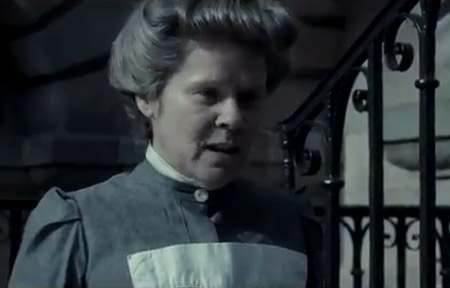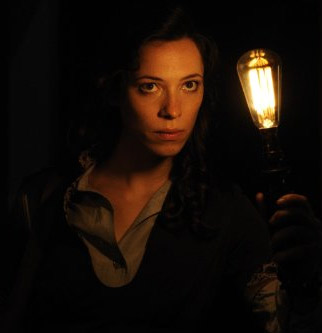London: "The Awakening", A Conversation
 Sunday, October 16, 2011 at 11:56PM
Sunday, October 16, 2011 at 11:56PM Editor's Note: As a special treat for our London Film Festival coverage, I asked our correspondents Craig and David to share conversations about the movies that they happen to see together. Today, The Awakening, a new British horror movie. One of them likes it a bit more than the other, but they agree that Imelda Staunton's delicious supporting turn keeps you fully awake...

I know this place and I don't hold with any ghostly nonsense."
-Imelda Staunton as "Maud Hill" in The Awakening.
Craig: A 1920s lady ghostbuster? Spooky mansions? Antique trip-wire traps and knitted-character dollhouse terror? And a twitchy Imelda Staunton as a housekeeper in period garb, topped with some fusty-dusty wig work?? I was fine and dandy with this one despite its flaws. It follows a somewhat shopworn, well-haunted pattern of housebound horrors quite fashionable in recent years (The Orphanage, The Others etc). Director Nick Murphy makes a few attempts at reminding us that The Haunting and The Innocents were key influences, too. It has one or two ripe, scoff-worthy moments but, on balance, it does contain some sneaky jumps and nocturnal bumps that – from the jittered reaction in the press screening – nobody could say they predicted. It has at its centre a solid enough feisty turn from a well-cast Rebecca Hall, too. This is scary movie territory that I’m gleefully at home with, so perhaps I can acknowledge its successes more readily than its few failings? It contains both, but I was never bored.
David: Aye, it's a fair enough yarn, but I can't really join you in the enthusiastic corner. There are a few jumps, but none of the sustained tension and ghostly atmospherics of a film like The Others. Bizarrely, the film charges up the haunted terror quickly, and it blows like a fuse halfway through, on a narrative passage that is effectively filmed but lacking in much power, since it's come around so soon. Afterwards, the characters are suddenly laying on wild emotional extremes, putting more weight on the relationships of the few lingering characters than seems comprehensible, as if we've been excluded from something. Naturally, we have; but pulling off a twist ending like these films usually do, requires a level of general believability beforehand, with just a sense of something being off.
 The period details are exquisite - I have no idea how realistic - and all the equipment Hall's character carefully sets up is quite the kick. What I don't think it comes close to pulling off is the tortured soldier sideline, and not just because Dominic West continues being unfortunately stiff and awkward in every role on this side of the pond. And I have to cry wolf on Rebecca Hall, too, I'm afraid. For me, there was no steel there, no conviction, just a weak and crumbling voice and a pale figure. When her façade broke, I saw little difference. The major thing convincing me that this was a confident, modern woman was the fact that she wore trousers.
The period details are exquisite - I have no idea how realistic - and all the equipment Hall's character carefully sets up is quite the kick. What I don't think it comes close to pulling off is the tortured soldier sideline, and not just because Dominic West continues being unfortunately stiff and awkward in every role on this side of the pond. And I have to cry wolf on Rebecca Hall, too, I'm afraid. For me, there was no steel there, no conviction, just a weak and crumbling voice and a pale figure. When her façade broke, I saw little difference. The major thing convincing me that this was a confident, modern woman was the fact that she wore trousers.
Sherlock Holmesian women and loopy hysteric performances after the jump...
Craig: For me part of the giddy joy with this one is, I think, because horror is such a rare commodity at the London Film Festival. I guess I’m intrigued as to what piqued and spooked the selection committee’s interest. Also, I think knowing so little about it helped, too.
David: You make a good point about it being an unusual selection, especially when it's due out in cinemas just a month later. There's a distinct 'type' of festival film, and this isn't really it. Which definitely makes it a more intriguing selection, and I wouldn't be at all surprised if Rebecca Hall had something to do with it.
Craig: I thought it did a find job of setting up its game pieces and playing them well, but maybe it didn’t ultimately entirely break free of its own muddled traps. It’s a fraught mess of hysterical tensions, dislocated personalities and uncertain perspectives (stuff I go gaga for) – but even if it explains its secrets ultimately rather too clearly, it did manage to stick to its spooky ground rules. Yes, the cameras, gadgets and other paranormal paraphernalia were great, I agree. I liked seeing them employed so inventively on screen. A thoughtful focus on period-perfect props isn’t always high on the agenda with flicks whose main intention is to simply scare us.
I enjoyed seeing Hall come on like a Diane Arbus of the afterlife – always alert and attached to a camera. She did do a lot of walking into rooms to quite obviously think-act for the camera, deducing something unfamiliar or untoward and transposing it to the other characters and audience alike. I’m not being facetious – I felt Hall continually made the tricky set of actions required of a woman in Florence Cathcart’s position feel like a cohesive performance. (It’s tricky to knowingly fathom mystery in front of other people and convey the fact that you’re holding cards close to your chest when everyone else is clueless and make it appear natural.) And at least she wore the trousers! I reckon we could do with a female Sherlock Holmes, a lady Poirot. There’s a franchise here, I feel...
 Ghost Hunting, period tools of the trade
Ghost Hunting, period tools of the trade
David: Despite my reservations about this particular performance, Hall is an appealing screen presence, and the latest actress who seems to be occupying a sort of middle ground between the mainstream and the arthouse. I understand what you're saying about how she approached the performance, but for me she didn't pull of the facade of strength in the first part of the film; it came across as a sort of haughty stiffness, rather than the gauche, critical woman I think she was supposed to be. And she rather overdid the hysteria in the final act for my money. All that said, a franchise where her character is less embroiled in the plot sounds mightily appealing. The opening scene especially seemed gang-busting evidence for this!
What frustrates me is that it had all the elements of a really effective film, but it didn't manage to put them together properly. And on the other side of that coin, it didn't make enough of a mess of itself to be enjoyable in the awful kind of way either; basically, I don't think they tried hard enough. The post-war conflicts seemed totally arbitrary, and it even has Rebecca throw out lines like, "I'm sure some of them even believe in God," as a throwaway comment. Subtext, delicious subtext, thrown away before my very eyes! Yes, it was clearly aiming at a less highbrow kind of entertainment, but it didn't work for me there either, so I'm flailing around for positives here. It was all too functionally delivered, with little artistry or thought put into how it was told; the clues to the shocking twist seemed to be thrown into the narrative at complete random. One thing I can't deny: Imelda Staunton really gets rolling in the last act, and it's a deliciously ripe fruit salad of a performance. I can never blame actresses for taking this kind of part; it's too much fun to see them cut loose. And she was cutting loose in some pretty stiff threads!
Craig: That kind of loopy-repressed hysteria in both Staunton’s and Hall’s performances (and, in part, in West’s, too!) was a true joy. Wrangled emotions amid spectral shenanigans go a long way with me. I'm keen to see where director Nick Murphy will go next. I’m hoping he might follow the likes of James Watkins, Toby Wilkins and Christopher Smith and keep the British horror end up in the longer term. I like this partial return to high-end horrors of old.
Craig: C+/B- / David: C



Reader Comments (3)
when did Imelda becomes such a "must see this" component of movies? I'd like to claim it was Vera Drake but i think it was probably Dolores Umbridge that turned her into a supporting superstar.
i like the idea of Rebecca Hall leading movies so I wish the general news was stronger than this.
I really enjoyed this film, particularly the cast. It was one of the fun discoveries at TIFF because there was so little advance word about it. The exteriors were shot at the house used in the BBC production of Pride and Prejudice. (I think that's right, I was so tired at the end of my stay at Toronto I may be confusing this with another film.) Always good to see Rebecca Hall in a large role. But it's true Imelda does stand out.
A "victorian woman in trousers" is, to me, usually lazy shorthand for a woman who is meant to be "contemporary", someone more like the modern moviegoer than the woman of her day: wants a career, wants equality, is unconventional and free spirited. But then those characters often fall into the same traps of behavior that indicate that she is really just another helpless female. Cate Blanchett's character in Oscar & Lucinda is probably an exception on that last point, although the trousers are really unnecessary, IMO, to convey her characterization.)